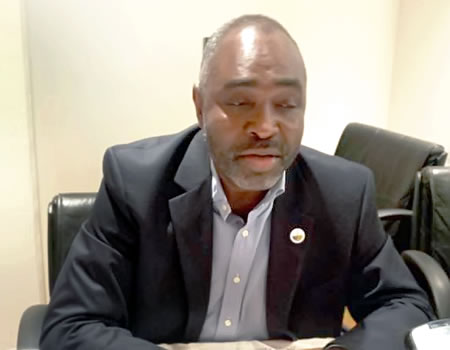We have been hearing that Nigeria’s crude oil reserves have been put at 37 billion barrels for ages. Why has it been static all these years?
No, it hasn’t been static. It is a plus and minus thing all the time. As we produce, it depletes. As we promote certain contingents into reserves, it increases. So, what has happened is that it is better to be flat than going down. I guess the strategy is to keep it flat if we cannot make it to go up. That’s why you are seeing 37 billion barrels when production is ongoing. Depletion is going on and replenishment is going on simultaneously. And when you have that kind of scenario, the figure could go up or down.
What we are saying is that we set a target of 40 billion barrels of reserves by 2020 for ourselves because we believe it is achievable; we think we know where the resources to produce that numbers are. What has happened is that over a period of not less than 10 years, we have had a short fall in JV funding. Typically, when there is a shortfall in JV counterpart funding from government, the area that takes the hit first is the exploration. So the amount of money earmarked for exploration has dwindled over the years and that’s directly proportional to discoveries.
If you don’t spend money, you don’t get anything back. It is risky quite alright, which is why when the issues of budget cut comes up, the most hit is exploration because of the associated risks. But once the present administration comes up with a formula to work on JV funding, we are beginning to see interest. Don’t forget also that compounded with that is the issue of security in the Niger Delta region which again in the last 15 years has been a major challenge.
A formula has been found also to address that challenge (JV funding) and it seems to be working. We have had a reduction in the vandalism of production infrastructure and that again has increased the confidence of the operators to step up.
ALSO READ: Lagos PDP rallies support for Bode George
Exploration has to take place outside your exploitation areas, but within the block you have and the process of swapping blocks, licensing rounds and so on is yet to take place. There are quite a number of fields that have been discovered but not certified by DPR into being called reserves. So even if you work on those alone, we can enter 40 billion barrels by year 2020.
You mentioned that two types of investors take interest in basins. Kindly throw more light on these types of investors and what do you think the government can do to attract these investors?
Examples of these investors are Tullow, Cosmos Energy and Anardeko. They are frontier basin type of companies. If you look at the traditional history of how they move about, they only go to places where companies like Shell do not go first. If you look at the scenario in Mozambique 10 years ago when the discoveries were initially made, there was a few companies but after discoveries, there were surge in interest by the international oil companies, and they buy out major stake in the company that made the discoveries.
The government must provide incentives. There is something that takes these companies to such basins in the first instance. We have to do a study because we can’t brag about Benue Trough to anybody. You can brag with the Niger Delta. You can say if you come in and make one billion barrels field, this is the incentive. We shouldn’t inhibit them at the beginning but make them as attractive as possible. For instance, in Ghana, the field was given freely; they tell you to commit to a minimum size, work on certain seismic data and certain numbers of well. Unlike ours that we typically attach a signature bonus to licensing rounds; they don’t do that.
Signature bonus can be applied to the Niger Delta which already is prolific and matured basins, but if you want to get somebody to go to Chad basin, or Benue trough to do something where no discovery has been made, you have to incentivise them properly. For instance, Niger Republic gives blocks freely and attaches work programmes to it.
When we attach signature bonus, remember they are to pay that first, they will pay for seismic and drilled wells, and after these efforts, they could still work dry. That risk is quite significant and government must ensure incentives to attract them to stay.
Somebody recently said Nigeria is losing out in terms of taking advantage of its hydrocarbon. He said in near future, crude oil may not be as attractive as it is today. He said we should pump as much oil as we can and take it to the market, make more money and develop other sectors. What is your opinion on this?
That’s true. Research and development never stops. Don’t forget that hydrocarbon is a combination of hydrogen and carbon. And water is hydrogen and oxygen. Now hydrogen is common to both of them. There is a research going on on how to begin to use water to power generators and cars. If that research hits the market with a breakthrough, that will be the end of reliance and needs for hydrocarbon. What we are saying essentially is that Nigeria has an infrastructural and developmental deficit.
Let the country generate enough revenues and develop all the infrastructure. Let Nigeria become a developed country and let quality of lives increase. Let’s use our money to diversify the economy from over-reliance on oil and gas. This is because if oil becomes suddenly unattractive, something else should be attractive and Nigeria has enough of all those opportunities. All we need to do is to use what we have right now to get what we need for future development.
So, what does low crude oil price portend to exploration because we need to replenish what we must have explored if we need to pump more oil for more revenue?
The issue is not about low oil price, but low profit margin. If the issue is that your profit margin is eroding, it’s a bad business to be in. So, rather than over-concentrate on the oil price, work on your profit margin. Call your contractors and bargain on reducing costs of producing oil so that there will be enough margin between cost of production and sales cost.
What would be the future of crude oil in Nigeria considering moves by advanced countries to shift focus from fuel-powered vehicles to electric-powered vehicles?
Demand internationally will be reduced. Local refining will increase. In broad terms, it means demand for our crude overseas will reduce. This is why we need to speedily maximise the benefits of the resource for the development Nigeria.
Forum urges National Assembly to override presidential veto on Peace Corps bill
WATCH TOP VIDEOS FROM NIGERIAN TRIBUNE TV
- Let’s Talk About SELF-AWARENESS
- Is Your Confidence Mistaken for Pride? Let’s talk about it
- Is Etiquette About Perfection…Or Just Not Being Rude?
- Top Psychologist Reveal 3 Signs You’re Struggling With Imposter Syndrome
- Do You Pick Up Work-Related Calls at Midnight or Never? Let’s Talk About Boundaries







